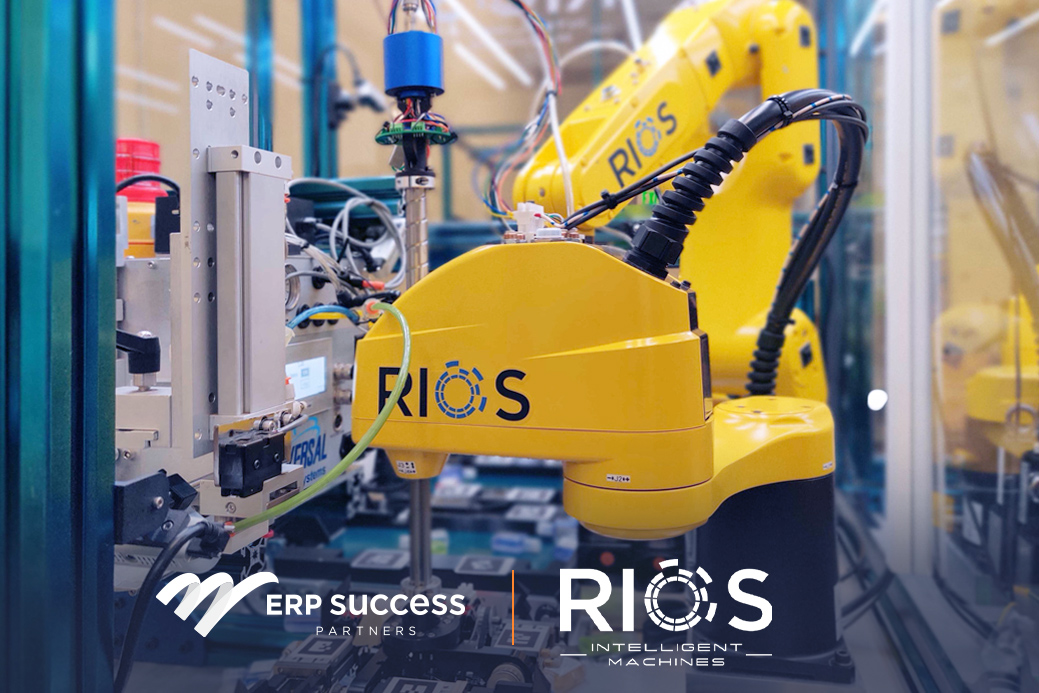RIOS works with ERP Success Partners to harness the power of NetSuite

By 2018, both a rising labor shortage problem and an over reliance on labor signaled the industry was reaching a breaking point. Then came COVID-19. By the time the worst of the pandemic was over, this prediction came true.
A group of former Xerox PARC engineers saw the writing on the wall and capitalized on the opportunity to build a new breed of intelligent machines that would power the factory of the future and help solve our labor shortage crisis. So, in 2018, they founded RIOS.
As body counts dwindled, the labor shortage ignited automation, which became a necessity for producers. RIOS forged the way by creating, developing, and operating fullstack AI-powered workcells on factory floors.
“We were founded on the principle that we needed to transform legacy industries and enable manufacturers of all sizes to have access to a scalable robotic workforce,” said Mike Park, VP of Operations. “Manufacturers can’t always maintain a steady workforce to do 72% of tasks in factories.”
Powerful Automation for Modern Enterprises
RIOS provides on-demand Factory Automation as a Service (FaaS) for businesses in key sectors of the economy such as manufacturing, consumer packaged goods, and food and beverage. RIOS’ goal is to architect the factory of the future powered by a suite of connected robotic workcells having higher cognitive skills, dexterity, and autonomy. These workcells are engineered so that they can truly become extensions of human operators on the assembly line. The workcells are software-defined machines that make use of the latest developments in machine learning (ML) to perform manufacturing tasks and learn from edge cases in real-world environments. In doing so, RIOS not only helps companies mitigate the ongoing labor shortage, but also helps to relieve our American workforce of mundane, dangerous work, while contributing to upskilling them
To make world-leading automation accessible to manufacturers, RIOS has helped pioneer and redefine the robots-a- a-service (RaaS) business model. Customers can lease robots on a subscription-based contract. RIOS’ solutions based RaaS model has shortened the sales cycle, allowing customers to purchase immediately instead of waiting for large CapEx funds. Raas shifts the responsibility of installing, updating and maintaining the hardware to RIOS, giving manufacturers one less thing to worry about.
Supporting Ongoing Expansion and Scale
As RIOS expanded its innovative product line and capabilities, the company began looking for an enterprise resource planning (ERP) platform that would oversee its growing business. The platform was required to integrate with existing engineering software tools and provide essentials like customer relationship management (CRM).
“At this point, we’re really looking to scale the business, both from a financial and an operational standpoint,” said John Hare, Sr. Supply Chain Program Manager. “We’re also doing a bit more complex financial analysis and NetSuite gives us the tools to be able to do that.”
The Right Implementation Partner
After several interviews, ERP Success Partners easily stood out due to their attractive financial incentives, technical support, and overall standards. RIOS went live with NetSuite within 3 months of engagement.
ERP Success Partners provided a tailor-made solution that allows RIOS to track monthly capital. Even more important, because of RIOS’ RaaS structure, tracking hours became too convoluted to handle with growth. Thanks to this platform, RIOS now has an automated system to track all RaaS offerings and time usage. With NetSuite’s fixed asset module, RIOS can collect data on the depreciation and maintain financial controls of these assets.
“QuickBooks is a good bookkeeping tool that everyone starts out on,” Park explained. “But when we got to the point where we had to start planning and tracking inventory on a per-piece basis —and getting a more detailed analysis of our financials, spending and other key data points— we started looking for an ERP platform tool.”
The partnership between ERP Success Partners and RIOS has been a very successful one. RIOS experienced seamless integration using the Procurify platform as a front-end procurement tool. This was integrated with NetSuite, as well as the ERP’s manufacturing and fixed assets modules.
RIOS has also improved its bill of materials (BOM) management and can better estimate its total manufacturing costs per robotic workcell.
“At this point,” Hare added. “Complete BOMs will just come out of our CAD software and go into NetSuite and allow us to create work orders to consume lower lever parts and assemblies and create our top level workcells ready for deployment to our customers.”
Hare added that there are a number of enterprises attempting to do what RIOS does on a much smaller scale.
“There are a lot of companies out there that’ll do some of these things, but I don’t think anyone has to the level that we have. We’re one of the market leaders in automated, robotic workcells and their deployment.” Mike Park, VP of Operations